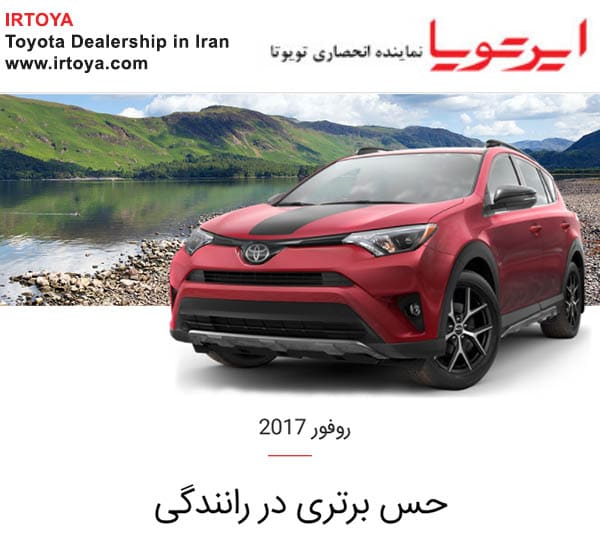Despite the implementation of the July 2015 nuclear deal, Iran’s hope for economic recovery continues to face the fears of international companies that they could be punished by the US if they do business with Tehran.
Writing for Radio Free Europe/Radio Liberty — with a contribution from EA — Frud Bezhan tells the story of how Toyota faced American retribution:
The world’s largest carmaker selling a single vehicle to a country of 82 million people is not usually a recipe for controversy.
But that’s what Toyota is facing after it issued an apology and revealed on October 24 that the Japanese car manufacturer’s Indian subsidiary, Toyota Kirloskar Motor Private, sold one vehicle to the Iranian Embassy in New Delhi in early 2017.
The apology has provoked an angry backlash in Tehran and highlighted the caution of multinational companies wanting to deal with Iran two years after a landmark deal to lift many international sanctions on the Islamic republic in exchange for halting sensitive nuclear work.
Toyota’s actions have fueled accusations in Tehran that Washington is pressuring foreign companies into avoiding business with Iran to effectively keep sanctions in place.
“It seems that America intends to scare international companies that are willing to cooperate with Iran, threatening them with open hostility and forcing them to apologize,” Iran’s hard-line Javan news website, affiliated with Iran’s powerful Islamic Revolutionary Guards Corps (IRGC), a branch of the armed forces, argued on October 24.
The reformist Shargh Daily appeared to double down on that sentiment, with editor Sadra Mohaghegh accusing the company of double standards by not responding similarly when Toyota cars are used for terrorist attacks in Syria, Iraq, and Afghanistan.
Uncertainty Over Europe
Ever since the 2015 nuclear agreement, officially known as the Joint Comprehensive Plan of Action, officials in Tehran have also accused Washington of pressuring Europeans not to do business in Iran.
US President Donald Trump has vowed to increase pressure on Iran, assailing Tehran as a “rogue regime” and threatening to walk away from the nuclear deal reached under his predecessor, Barack Obama. Trump on October 13 declined to certify Iran’s compliance under a US law tied to the JCPOA. Accusing Tehran of violating the “spirit” of the deal, Trump said he would ask Congress to strengthen a US law to put additional pressure on Tehran.
Trump said in an interview aired on October 22 that he was not against France or Germany doing business with Iran.
“When they buy those things, it is a little harder,” Trump said of French and German commercial dealings with Iran. “I told them just keep making money. Don’t worry. We don’t need you on this one.”
US Secretary of State Rex Tillerson said on October 20 that the Trump administration does not intend to disrupt European commerce with Iran.
“The President’s been pretty clear that it’s not his intent to interfere with business deals that the Europeans may have underway with Iran,” Tillerson told The Wall Street Journal.
But Tillerson said on October 25 in New Delhi that “as we are taking actions to impose sanctions on the [Iranian] regime…it’s our objective to deny financing capacity and to disrupt the activities related to these malign behaviors,” citing Tehran’s ballistic-missile program, its “export of arms to terrorist organizations,” and alleged involvement in conflicts in Syria and Yemen.
Fear of Fines
Michel Jacinto, an analyst at HIS Jane’s in London, says that, while many companies have no official policy of not dealing with Iran, some are afraid of being fined by US authorities.
“Many companies are hesitating, maybe out of fear, because the United States has threatened to reimpose sanctions,” Jacinto says.
“Companies that do a large amount of business in United States may be more afraid than others,” he adds, noting that the United States is Toyota’s largest market.
Toyota suspended its exports to Iran in 2010, soon after the United Nations, United States, and European Union imposed sanctions against Tehran’s financial and resources sectors.
On its official website, Toyota says it “has stopped and is not currently conducting any business transactions involving Irtoya,” its former distributor in Iran.
“The US is strong-arming many companies,” says Steve Hanke, an economist teaching at Johns Hopkins University in Baltimore. “This amounts to the imposition of secondary sanctions. Everyone is afraid of these real or implied ‘secondary sanctions.'”
Even when all U.S. nuclear-related sanctions were lifted, Washington maintained or added unilateral sanctions linked to Iran’s human rights record, alleged support for terrorism, and its controversial ballistic-missile program.
Those sanctions forbid US citizens and companies from doing most forms of business with Tehran, but companies outside the United States are also affected. Iranian banks and foreign banks that are processing Iran-related transactions are not allowed to deal in US dollars — the global reserve currency.
A “Tough-Guy Approach”
Existing US sanctions also extend to organizations and individuals with ties to the IRGC, which is estimated to control around 40% of the Iranian economy.
The existing US sanctions have left big banks and multinational companies worried they could still be prosecuted for doing business with Iran.
“The US Treasury Department is a real stickler when applying sanctions law,” says Scott Lucas, an Iran specialist at the University of Birmingham in Britain and editor of the EA WorldView website.
Lucas says Iran’s deals with Boeing and Airbus for the purchase of airliners, for example, have been held up because it is unclear how such transactions will be financed and transacted.
Over the past decade, some of the world’s top banks — including HSBC and Deutsche Bank — have paid billions of dollars in fines for Iran-related activities.
Lucas also suggests the Trump administration is “stepping up the tough-guy approach with Iran.”
In an unprecedented move, the Trump administration recently added the IRGC to its counterterrorism sanctions list.

